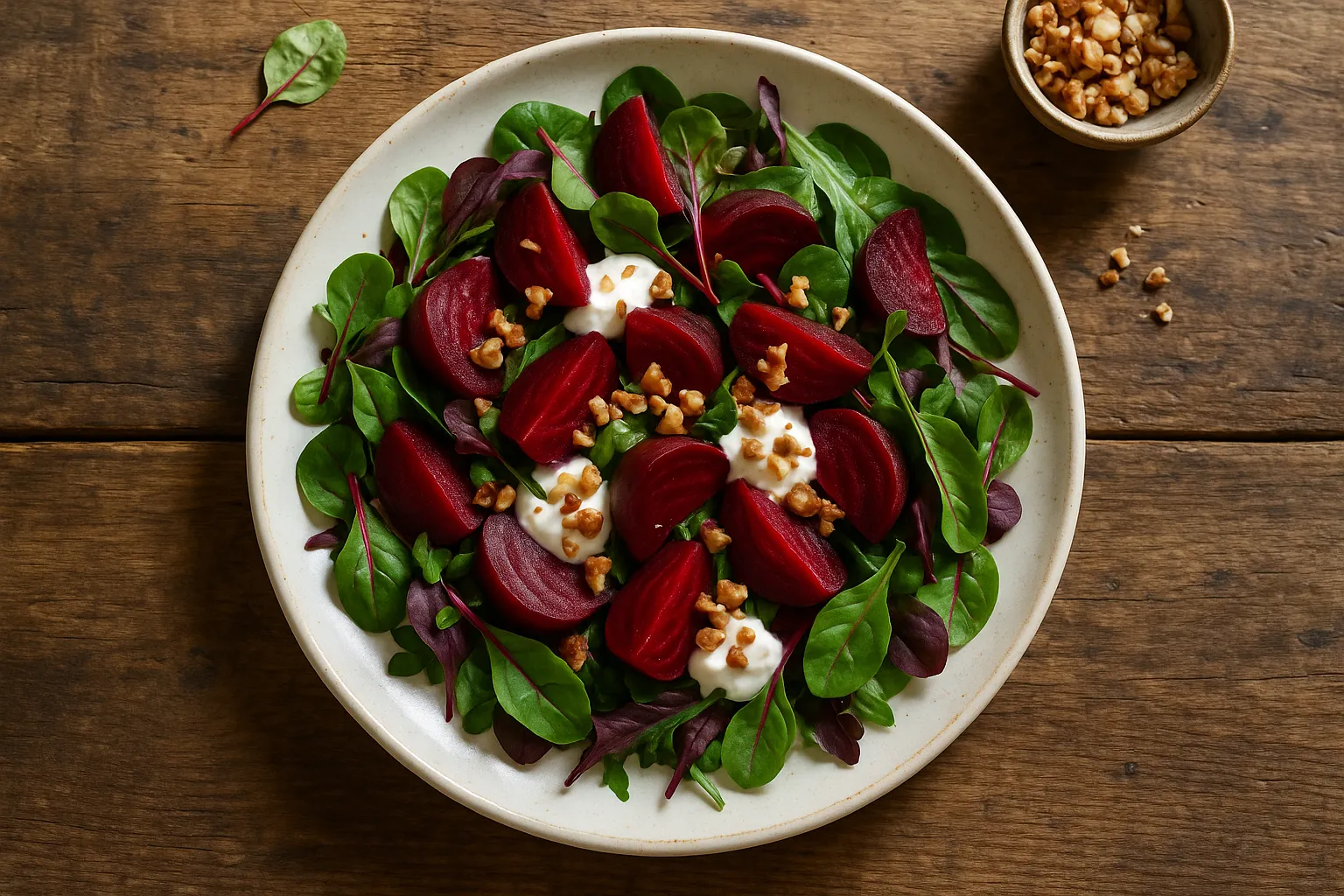Beetroot Salad: Calories, Nutrition and Health Benefits
Nature's performance booster packed with nitrates for blood pressure control, exercise endurance, and vibrant nutrition in every colorful bite.
Quick Nutrition Facts
Per 100g Serving
| Nutrient | Amount |
|---|---|
| Calories | 45 kcal |
| Protein | 2.1g |
| Carbohydrates | 8g |
| Fiber | 2.8g |
| Sugars | 5.2g |
| Fat | 0.9g |
| Potassium | 325mg |
| Folate | 109mcg |
| Vitamin C | 18mg |
| Iron | 0.8mg |
Macronutrient Breakdown

NUTRITIONIST INSIGHT
Beetroot salad is a nitrate powerhouse - the natural nitrates convert to nitric oxide, improving blood flow, lowering blood pressure, and enhancing exercise performance. The betalain antioxidants give beetroot its deep red color and provide powerful anti-inflammatory benefits.
Myth Busters
MYTH #1: Beetroot Salad Has Too Much Sugar
TRUTH: While beetroot contains 5g natural sugar per 100g, the 2.8g fiber significantly slows sugar absorption, resulting in a low glycemic load. Unlike refined sugars, beetroot sugars come with vitamins, minerals, and beneficial nitrates.
MYTH #2: Beetroot Permanently Stains Your Teeth
TRUTH: The red pigment (betalain) may temporarily color teeth but washes away easily. Simply rinse mouth with water after eating or brush teeth normally. The antioxidant benefits far outweigh this minor cosmetic concern.
MYTH #3: Beetroot Salad Is Only for Weight Loss
TRUTH: While excellent for weight loss (45 calories per 100g), beetroot salad benefits athletes tremendously. The nitrates improve oxygen efficiency and exercise endurance by 2-16%, helping both endurance and high-intensity performance.
MYTH #4: Raw Beetroot Is Dangerous
TRUTH: Raw beetroot is perfectly safe and retains more nutrients than cooked. The oxalate content is moderate (not dangerous unless you have kidney stones). Always wash thoroughly and peel if concerned about soil bacteria.
MYTH #5: Beetroot Salad Causes Kidney Stones
TRUTH: Beetroot contains moderate oxalates (110mg per 100g), not extremely high. Only people with existing kidney stone history should limit intake. For most people, the benefits of fiber, potassium, and folate outweigh oxalate concerns.
MYTH #6: You Need Beetroot Juice, Not Salad
TRUTH: Beetroot salad provides the same nitrates as juice plus fiber for satiety and blood sugar control. Juice lacks fiber and concentrates sugars. Whole beetroot salad is superior for overall health and weight management.
NutriScore by Health Goals
| Health Goal | NutriScore | Why This Score? |
|---|---|---|
| Weight Loss |  | Only 45 calories per 100g, 2.8g fiber promotes fullness, high volume food. You can eat 300g for just 135 calories. |
| Muscle Gain |  | Nitrates improve exercise performance and blood flow to muscles. Add protein source (chicken, tofu, nuts) for muscle building. |
| Diabetes Management |  | Low glycemic load, fiber slows sugar absorption. Moderate natural sugars require portion control to 100-150g serving. |
| PCOS Management |  | Anti-inflammatory betalains, folate supports hormonal balance, low calorie density aids weight management critical for PCOS. |
| Pregnancy Nutrition |  | Rich in folate (109mcg per 100g) supports fetal development, iron aids blood production, fiber prevents constipation. |
| Viral/Flu Recovery |  | Vitamin C boosts immunity, antioxidants reduce inflammation, easy to digest, hydrating from high water content. |
PERSONALIZED NUTRITION
Track your meals with NutriScan for personalized NutriScores based on your specific health goals!
Blood Sugar Response to Beetroot Salad
Understanding how beetroot salad affects blood glucose helps with portion control and meal planning.
Typical Glucose Response Curve
*This chart shows typical blood glucose response for general healthy individuals. Individual responses may vary. Not medical advice.*
How to Minimize Blood Sugar Impact
Pairing beetroot salad with protein and healthy fats slows sugar absorption and provides balanced nutrition:
- 🥚 Boiled eggs or egg salad - Protein stabilizes blood sugar
- 🐟 Grilled salmon or tuna - Omega-3s and protein
- 🌰 Walnuts, almonds, or pumpkin seeds - Healthy fats and crunch
- 🥑 Avocado slices - Monounsaturated fats slow digestion
- 🧀 Feta or goat cheese - Protein and calcium
These combinations create a complete meal that maintains steady energy for 3-5 hours.
Cultural Significance
Beetroot has been cultivated for over 4,000 years, originating in the Mediterranean and Middle East regions.
Historical Journey:
- Ancient Romans used beetroot for blood disorders and digestive issues
- Russian borscht made beetroot a cultural icon in Eastern Europe
- Victorian England prized pickled beetroot for preserving
- Modern research validated ancient health claims with nitrate science
In India:
- Introduced during British colonial period
- Popular in North Indian salads (kosambari, kachumber)
- Ayurveda uses beetroot for liver cleansing and blood building
- Growing trend in urban health-conscious communities
Global Impact:
- Research hub: UK, Netherlands lead beetroot sports nutrition studies
- Athletes worldwide use beetroot for performance (Tour de France cyclists)
- Health food movement embraced beetroot as superfood
Compare & Substitute
Beetroot Salad vs Similar Vegetable Salads (Per 100g)
| Nutrient | 🥗 Beetroot Salad | 🥕 Carrot Salad | 🥒 Cucumber Salad | 🥬 Kale Salad |
|---|---|---|---|---|
| Calories | 45 kcal | 41 kcal | 16 kcal | 49 kcal |
| Carbs | 8g | 10g | 3.6g | 9g |
| Fiber | 2.8g | 2.8g | 0.5g | 2g |
| Protein | 2.1g | 0.9g | 0.7g | 4.3g |
| Fat | 0.9g | 0.2g | 0.1g | 0.9g |
| Folate | 109mcg | 19mcg | 7mcg | 141mcg |
| Vitamin C | 18mg | 5.9mg | 2.8mg | 120mg |
| Best For | Blood pressure, exercise | Eye health, vitamin A | Hydration, low-cal | Protein, calcium |
Frequently Asked Questions
Is beetroot salad good for weight loss?
Yes, beetroot salad is excellent for weight loss. At only 45 calories per 100g with 2.8g fiber, it provides high volume and satiety with minimal calories. The nitrates also improve exercise efficiency, helping you burn more calories.
Weight loss strategy: Eat 200-300g beetroot salad as main dish (90-135 calories); add protein (grilled chicken, boiled eggs, tofu) for complete meal; use lemon and herbs instead of high-calorie dressings; consume before main meal to reduce overall intake.
Can diabetics eat beetroot salad?
Yes, diabetics can eat beetroot salad in moderation. The fiber content helps manage blood sugar, but natural sugars require portion control.
Diabetic guidelines: Limit to 100-150g per serving (4-6g net carbs); always pair with protein and healthy fat; eat as part of meal, not alone; monitor blood sugar response initially; choose fresh over pickled (pickled has added sugars); prefer raw over cooked (lower glycemic impact).
Does beetroot salad lower blood pressure?
Yes, beetroot salad can significantly lower blood pressure. The dietary nitrates convert to nitric oxide, which relaxes blood vessels and improves blood flow.
Blood pressure benefits: Studies show 4-10 mmHg reduction in systolic blood pressure within 2-3 hours; effects last 12-24 hours; requires 200-250g beetroot for therapeutic effect; regular consumption provides cumulative benefits; works alongside medication (consult doctor before major dietary changes).
What are the main health benefits of beetroot salad?
Key Benefits:
- Exercise Performance: Nitrates improve oxygen efficiency by 2-16%
- Blood Pressure: Natural vasodilator lowers BP by 4-10 mmHg
- Anti-inflammatory: Betalain antioxidants reduce inflammation markers
- Heart Health: Nitrates and potassium support cardiovascular function
- Digestive Health: 2.8g fiber supports gut bacteria and regularity
- Cell Growth: 109mcg folate per 100g supports DNA synthesis
When is the best time to eat beetroot salad?
Depends on your goal:
- Athletic Performance: 2-3 hours before workout for peak nitrate effect
- Blood Pressure: Morning with breakfast for all-day benefits
- Weight Loss: Lunch or dinner as main salad with protein
- Digestion: Avoid late night (can cause gas in sensitive individuals)
IMPORTANT NOTE
Beetroot may turn urine and stools red (beeturia) - this is harmless and temporary.
Can I eat beetroot salad daily?
Yes, eating beetroot salad daily is beneficial for most people. It provides consistent nitrates, antioxidants, and fiber without excessive calories.
Daily consumption guidelines: 150-200g daily is optimal; rotate with other vegetable salads for nutrient diversity; reduce to 100g if prone to kidney stones (oxalate concern); monitor digestive response (can cause gas in some); drink plenty of water to help process oxalates.
How do I make beetroot salad taste better?
Flavor combinations: Add citrus (lemon, orange) to balance earthiness; mix with apples or pears for sweetness; include nuts (walnuts, almonds) for crunch; use herbs (mint, cilantro, dill) for freshness; add feta or goat cheese for creaminess; dress with balsamic vinegar and olive oil; roast beetroot for sweeter flavor.
 ChatGPT
ChatGPT  Claude
Claude  AI Mode
AI Mode  Perplexity
Perplexity 



